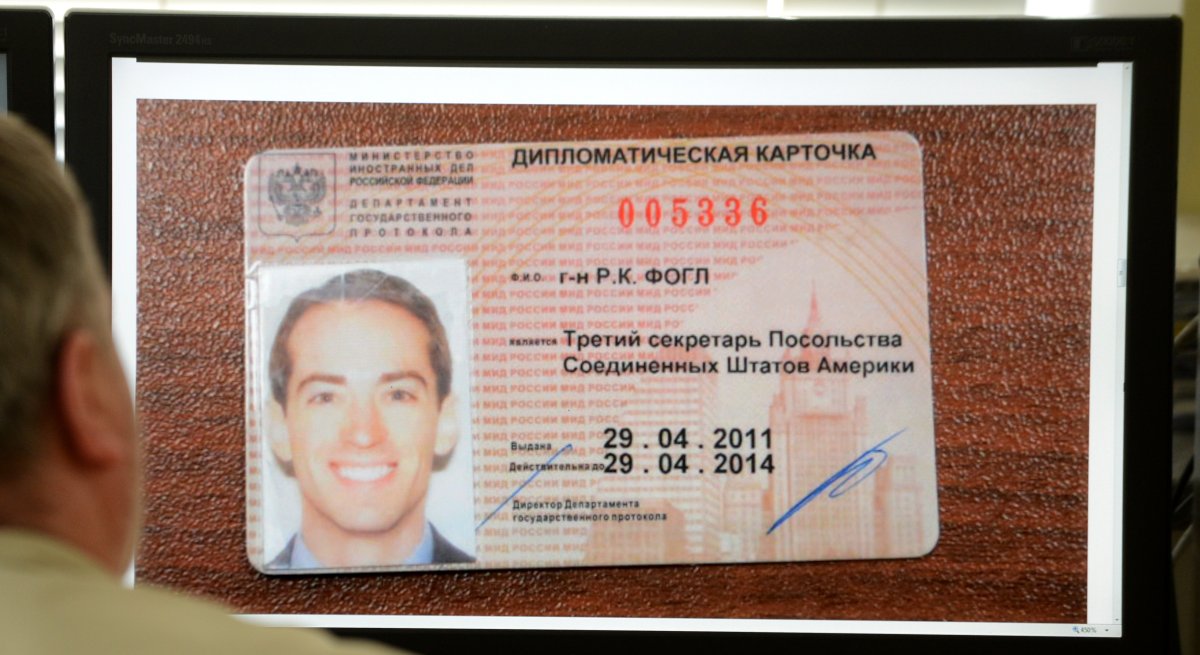A young U.S. diplomat is now “persona non grata” in Russia for allegedly conspiring to recruit a spy, the country’s Federal Security Service (FSB) has revealed.

Donning a blond wig and a baseball cap, Ryan C. Fogle was detained in Moscow Tuesday night – allegedly carrying a trove of evidence linking him to espionage.
Among other things, FSB said Fogle, the third secretary of the Political Section at the U.S. Embassy in the capital city, allegedly had a letter with him containing instructions on how to spy for the CIA.
According to a translated statement on the Ministry of Foreign Affairs website, he also had with him a “spy arsenal” that included another wig, a folding knife, compass, a microphone, a mobile phone, three pairs of glasses and an undisclosed amount of 500-euro bills.
FSB released the alleged instructional letter, reportedly found in Fogle’s belongings, which offered $1 million a year – plus bonuses – for “long-term co-operation.”
It also advised how to carry out communications – using a new Gmail account and Internet cafes to carry out communications.
Read the full letter below
The Foreign Ministry also compared the arrest to the days of cold-war era espionage.
“While our two Presidents reaffirmed their readiness to expand bilateral cooperation, including through intelligence agencies in the fight against international terrorism, such provocative actions in the spirit of the “cold war” does not contribute to building mutual trust.” (Google Translation)
Interestingly enough, those communication tactics and the payment of hefty sums for intelligence aren’t things that are too unfamiliar to Russia’s own agencies.
In January of this year, former Canadian navy officer Jeffrey Paul Delisle was convicted of selling classified information to Russia.
During a nearly four-year period, Delisle received 23 money transfers from Moscow, via Ireland, amounting to almost $72,000. He also took another $40,000 from a Russian agent during a 2011 trip to Brazil.
In interrogation footage released toward the end of his trial, Delisle detailed how he transferred information using old floppy disks, USB sticks and a web-based email account.
The FBI alerted its RCMP counterparts about Delisle’s spy activities in Dec. 2011 – about six weeks before he was arrested in Halifax.
Delisle admitted during his interrogation he walked into the Russian embassy in 2007 and offered his services.
The 41-year-old was the first person to be convicted under Canada’s Security of Information Act.
In an interview with ABC News, Russia specialist Mark Galeotti said he was surprised about the Russian government’s handling of the arrest.
WATCH: Footage of Russian authorities arresting Ryan Christopher Fogle
Reuters reports Russia’s Foreign Ministry called on U.S. ambassador Michael McFaul to discuss the situation, but Russia Today said he refused to comment to its reporter when asked about the spy allegations.
McFaul was taking part in a Twitter Q & A when the news about Fogle’s arrest broke.
This is the Associated Press’ translation of the typewritten letter shown on Russian state television channels:
Dear friend,
This is an advance from someone who is very impressed by your professionalism and who would greatly value working together with you in the future. For us, your safety is of the utmost importance, so we have chosen this route to make contact with you. And we will continue to take steps to secure your safety and keep our correspondence secret.
We are prepared to offer you $100,000 and discuss your experience, expertise and co-operation, and your payment might be far greater if you are prepared to answer some specific questions. Additionally, for long-term co-operation we offer up to $1,000,000 a year with the promise of additional bonuses for information that will help us.
To contact us again, please open a new Gmail account, which you will use only for communicating with us, in an Internet cafe or a cafe with a WiFi connection. When signing up, do not use any personal information that could be used to identify you and the new account. So do not offer any real contact information, i.e. your telephone numbers or other email addresses.
If Gmail asks for your personal information, please, start the registration process again and try not to give them any information. After you register the new inbox, send an email to the address unbacggdA(at)gmail.com, and then check the inbox again exactly one week later to see if you have received our reply.
If you register the new email account in a cafe with a netbook or another device (for example, a tablet), then please do not use your own device with your own personal data on it. If possible, you should get a new device to connect with us, for cash. We will reimburse you for the purchase.
Thank you for reading this. We eagerly await the possibility of working with you in the near future.
Your friends.
*With files from The Associated Press





Comments